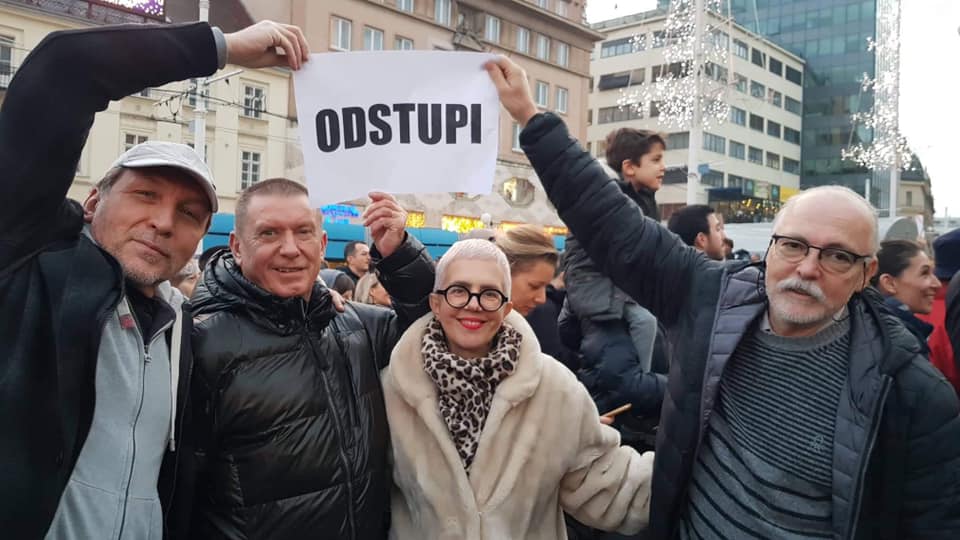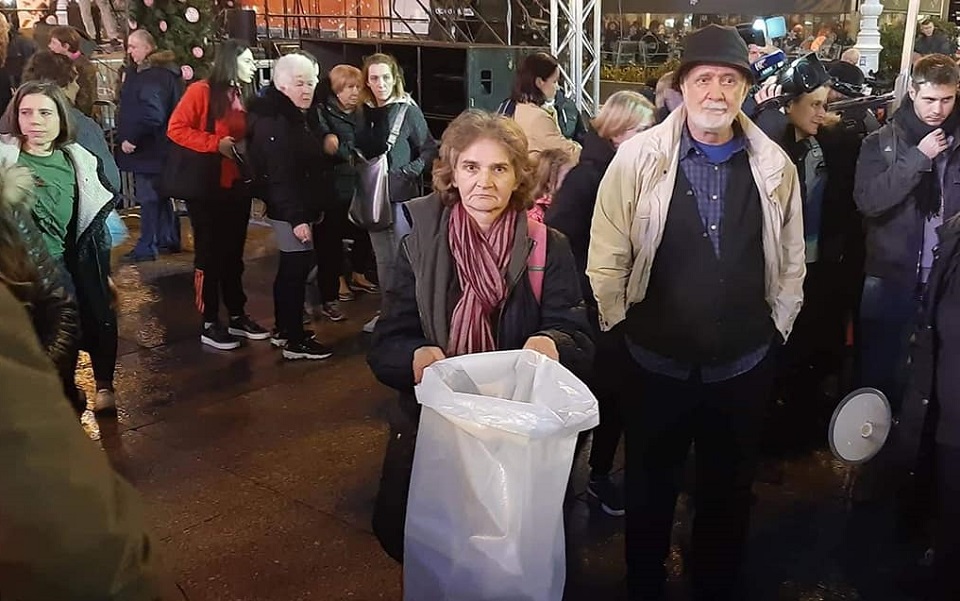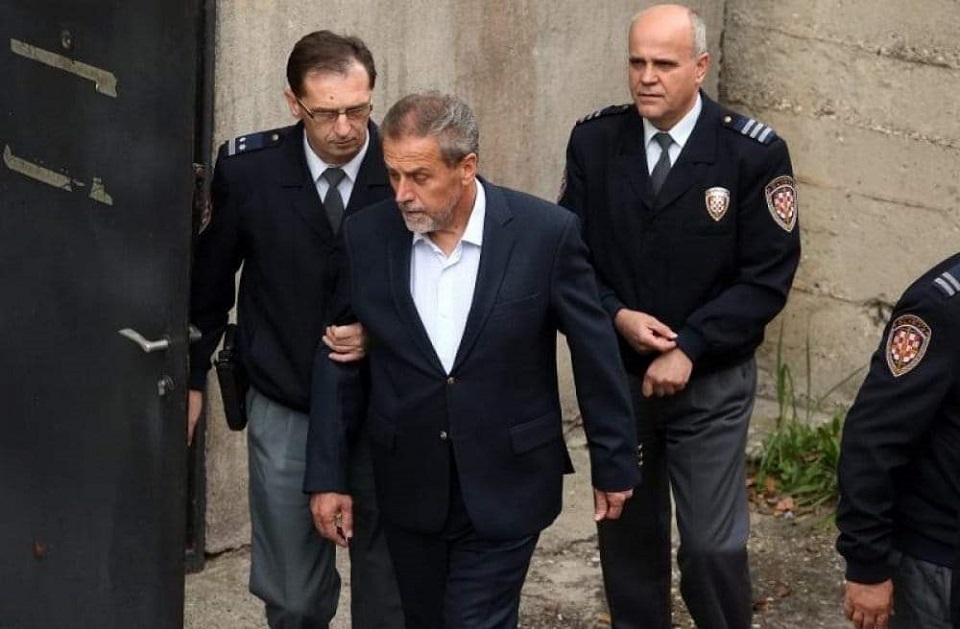Zagreb Residents Chant 'Prison' at Protest Against Mayor Milan Bandić
More than 1,000 Zagreb residents and supporters chanted “prison” for Mayor Milan Bandić at yesterday’s protest in the city's downtown square.
The demonstration, which was organized to protest the Zagreb mayor and multiple USKOK (Croatian State Prosecutor's Office for the Suppression of Organized Crime and Corruption) inductee Milan Bandić, was held at Trg bana Jelačića, the main city square, according to Index on December 21, 2019.
The protest began at 16h and was organized by a number of associations: Udruga građana Siget (the Siget Citizens' Association), Braniteljska udruga Vidra (the Veterans of Vidra), Veterani i društvena akcija sa Zelenim odredom (the Veterans' Association with Green Squad social action group), Udruga za zaštitu okoliša UZOR iz Resnika (the UZOR Environmental Association of Resnik), Udruga Eko-Zagreb (the Eco-Zagreb Association), Inicijativa Samoborček (the Samoborček Initiative), Inicijativa Hipodrom (the Hipppodrome Initiative), and the građanska inicijativa Zagreb bez zračenja (Zagreb Radiation-Free Initiative).
According to organizers, the protest gathered around two thousand citizens. They are planning another protest at the end of January.

Clear Message from Zagreb Protesters: Resign!
Among the messages on the banners were "Resign", "Enough of Banditism", "Your Mayor is poisoning you and robbing you", "Bandić's godfathers: You will fall into Resnik" (Resnik is a garbage dump in Zagreb), "Put the right thing (Bandić) in the right place in Remetinec" (Remetinec is a Zagreb prison), "Zagreb must not be defined by Milan Bandić"," Whose benefitting from the garbage centers?" and "Bandić and his 26 bandits".
City Council 'Thieves' Voted for Waste Removal Cost Increase
They explained that these "26 thieves" are the city council members who voted for an increase in waste collection costs and will be voting on the GUP (General Urban Plan). The protesters also exhibited four garbage bags which contain the names of the mayor and his associates, Mirka Jozić and Sanja Jerković, with one bag saying "26 city deputies."
They called the bags "radioactive waste", which they say will be taken to Bandić and the Zagreb City Administration on Monday where they will be placed under a pine tree.
Gordana Pasanec, from the Siget Citizens’ Association, said that they were protesting because they were fed up with Milan Bandić's despotism, from the "golden toilets", and benches for 20, 30, 40 thousand HRK, his bullying of city government staff, and his insults directed at journalists and citizens.
She also pointed out that Zagreb is separating only 10 percent of its waste, there is no real waste management system or fair billing and Zagreb streets are flooded with waste.
"The chaos we are witnessing is the result of a long-standing (lack of) waste management policy implemented by the Mayor of Zagreb. There is no single justifiable reason for this; no increase in services except for the systematic robbery of citizens by the Mayor through waste collection, which has benefitted individuals and interest groups for 20 years.
Branka Genzić-Horvat from UZOR said that they have been protesting for 14 years and because they are fed up with what is happening and want to make Zagreb a better place to live.

Pensioner in Wheelchair Calls Bandić 'Garbage'
Višnja Škreblin, who was introduced as the oldest activist, said that Bandić has consolidated his power (over the city) and has humiliated and belittled its citizens. “He says 'if you can't pay the cost of utilities and services, then you should leave Zagreb,’” which infuriated the wheelchair-bound pensioner, who publicly called Bandić "garbage."
"We have been witnessing this for 14 years. And it all started back in 2005 under the leadership of a mayor who has put himself at the forefront of these interest groups. The Waste Management Center is a continuation of concocted thievery, which this mayor carries out in the interest of specific groups and individuals. The Ministry of the Environment has backed an octopus who has ruled Zagreb and Croatia for many years," she said. She also said that for 14 long years they have been closely watching every step of this mayor and now the “water has reached her throat".
Ivan Kos from the Eco-Zagreb Association said that what Mayor Bandić is doing was "unacceptable".
Fled Scene of Drunk-Driving Accident in 2002
Bandić, a onetime member of SDP (Social Democratic Party) was elected mayor of Zagreb in 2000 and re-elected in 2001. In 2002, Bandić fled from the scene of a motor vehicle accident while under the influence of alcohol and was forced to resign.
The Zagreb SDP had the authority to nominate a new mayor, but the city council was so dominated by Bandić that it was questionable who would be able replace him. Eventually Vlasta Pavić took over, while Bandić retained a position as deputy mayor. However, he was eager to become mayor again, and blocked Pavić's development plans while pushing for an early election. In response, Ivica Račan (then head of SDP) tried to restrain Bandić's activities.

Successful Power Grab Led to 2005 Reelection
At that time, the law would not allow Bandić to serve a second term as mayor. Although Vlasta Pavić attempted to strike a deal to end their ongoing feud, but Bandić eventually succeeded in undermining her authority. Even though early elections were not held, he was re-elected mayor in 2005.
Bandić is currently serving his sixth term as Mayor of Zagreb. His administration has been defined by scandal and accusations of corruption. Bandić left SDP in 2009 and identified as an independent candidate for six years. In 2014, he was arrested on charges of corruption, bribery and organized crime, along with two other members of the Zagreb City Council. In 2015, he founded his own party, the Bandić Milan 365 – Labor and Solidarity Party. The 365 in his party’s name refers to his claim that he works for the city of Zagreb as mayor every day of the year.
In the 2017 local elections, Bandić narrowly defeated challenger Anka Mrak Taritaš. His current term ends in 2021.
Follow our Politics page to keep up with protests against the Bandić administration. For more information on upcoming protests against the Mayor, check out the Zagreb Te Zove (Zagreb is calling you) page on Facebook.
Corruption in Croatia: The Main Reasons Foreign Investors Withdraw
As Poslovni Dnevnik/Lucija Spiljak writes on the 12th of December, 2019, the Republic of Croatia loses more than ten percent of its GDP annually due to corruption, fraud and financial crime, and last year, according to the Corruption Perceptions Index, Croatia ranked a somewhat unimpressive 60th out of 180. Corruption in Croatia is rife, but what can we do to stop it, and what is being put in place to help?
Foreign investment should be (and indeed could be) a happy story indeed. This country boasts a wealth of opportunity and potential, but red tape, draconian laws and corruption in Croatia tend to put them off.
Yuri Sidorovich, Deloitte's foremost partner for forensics in the Adriatic region discussed the challenges of corruption in Croatia shortly after the International Fraud Awareness Week, which was rather symbolically held for the very first time in Croatia.
What are the main causes of and reasons for corruption and fraud?
Corruption and fraud are a social phenomenon triggered by a number of factors; from achieving sales goals and a lack of control, to factors that are more psychological in their nature, with the attitude of "why wouldn't I take what belongs to me?" In an environment with high levels of tolerance for corruption, these factors are of course heightened. Poorly developed corporate governance mechanisms, the ineffective prosecution of perpetrators, and large social disparities create a ground for corruption that gradually enters all pores of society.
Then where do we go from there, and how can we restore confidence in the system?
We must first admit that we have a problem. It's human nature to close our eyes to problems and to look for solutions when they are already "burning" away. This is also true of corruption, and despite its long history, only 25 years ago did any serious analysis really begin. What are the solutions? All models of theoretical fraud risk management emphasise the role of those at the top and management in this process, which must be driven by positive examples and dedicated to problem solving. It’s a key factor in starting something, moving forward and getting the right resources. There are no quick fixes with a magic effect. We must firmly decide that we want to change things and insist on investing in instruments to raise awareness and combat corruption. We all know that trust is something we can lose quickly and that it's hard to regain. Unfortunately, we're currently in a situation where confidence is at a very low level and it will take a lot of effort to repair this image.
What about the judiciary?
Penalties and sanctions are certainly an important deterrent to corruption, but only if they're implemented systematically. Unlike in countries with Anglo-Saxon law, a major problem in our environment is that we don't enforce laws effectively. If we just look at the numbers and amount of settlements that companies pay for open cases of violations of the American anti-corruption FCPA law, we can see that these are multimillion dollar amounts, they even go into the billions, and they're a sore spot for even the world's largest corporations. The resources that these companies invest in preventing corruption and ensuring business coherence are, of course, at a completely different level than what we're used to. We need to prosecute individuals, but the responsibility of legal entities for crimes is also important, which we must begin to recognise and sanction. Unfortunately, there is still the impression that the courts don't have sufficient power to deal with financial crime professionally and apolitically.
Where does Croatia rank on Transparency International's corruption perceptions index?
According to the Corruption Perceptions Index 2018 survey, Croatia ranks 60th out of 180, it's in the company of countries such as Saudi Arabia, Cuba and Romania.
This index measures the perception of corruption in the public sector by experts and businessmen, therefore it doesn't reflect the general state of this problem in the country. More than the general index, we should be interested in the health situation, on how much we invest in public infrastructure and how we can solve specific problems in the most neglected industries. Some serious analyses are lacking here that would provide a foundation and focus on narrower areas.
What is Deloitte's involvement in fighting corruption, fraud and financial crime in the region, and what are the results?
As the world's largest consulting firm, we're privileged to be able to observe good practices in a wide variety of environments. In doing so, we can see that awareness-raising measures are one of the priorities in the fight against corruption. It was in this area that Deloitte was particularly engaged. As part of International Fraud Awareness Week, we've taken the initiative and created a forum for relevant stakeholders looking to contribute to something positive in the process. We're all aware that the result of our work will not be visible tomorrow, maybe it won't be visible even in another five years, but we do hope that one day we'll be able to look back and see that we've done something right. As for the attitude of companies towards this problem, we're seeing progress today. More and more companies are looking to set up anonymous reporting lines for irregularities, increase employee awareness and get early detection capabilities with advanced analytics tools and the like. These measures will certainly contribute to raising awareness in corporate governance.
How do the challenges you cite affect the system, the economy and the confidence of foreign investors?
There are various estimates of the effects of corruption, including those that say that we're losing more than 10 percent of our GDP annually owing to corruption in Croatia. These macro estimates make it clear that we all pay the price of corruption.
What we see on a daily basis are cases where foreign investors withdraw from the purchase process because of the risk of business compliance and financial consequences, and for the same reasons, foreign companies terminate product distribution agreements. Foreign investors and business partners are extremely sensitive to any regulatory compliance issue and just aren't prepared to compromise there. I don't think it's a question of whether or not there will be investment, but what is the price we have to pay for it.
How to identify corruption coming from outside on time?
Corruption always has two sides; someone who offers something valuable and someone who will accept it and make biased decisions. No matter who from the outside is trying to influence, we can build a culture that will refuse such offers, but we can't expect such a mechanism to always work. The potential of technology must also be taken into account. The advancements in advanced analytics tools are truly remarkable, and we can expect to utilise solutions that offer criminal profiling of company-risk events here. This, in turn, will deter individuals from any wrongdoing and increase the integrity of the business.
Make sure to follow our dedicated business page for much more on what's being done to put a stop to corruption in Croatia.

